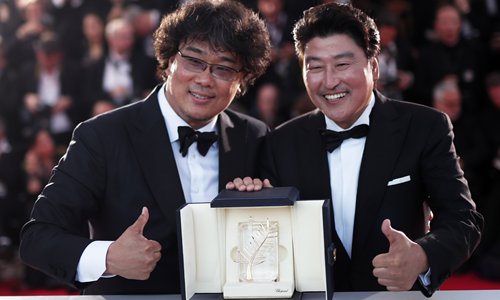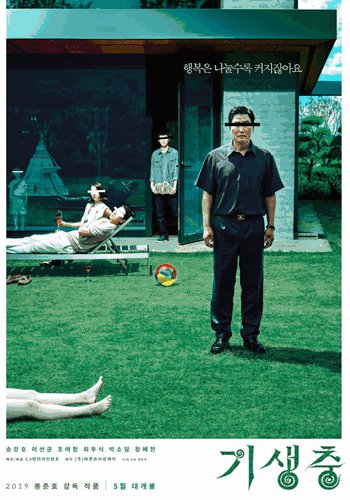HOME >> ARTS
Bong Joon-ho’s ‘Parasite’ sparks discussion in Chinese mainland
By Chen Xi Source:Global Times Published: 2019/8/14 18:18:40

South Korean director Bong Joon-ho (left) and actor Song Kang-ho (right) Photo: IC

Poster for Parasite Photo: IC
Three months after South Korean film Parasite won the Palme d'Or at the 72nd Cannes Film Festival, it has become a top ranked movie in the Chinese mainland, earning an 8.9/10 on Chinese rating site Douban from more than 220,000 reviews.
The hashtag for the South Korean film directed by Bong Joon-ho has more than 320 million views on Sina Weibo and sparked numerous discussions on Chinese social media.
Different voices
Gao Xiaosong, a Chinese film director and composer, commented that "the art and skill on display in the film is of a high level."
However, some netizens have also raised some questions about the film.
"Why do the four family numbers still live in a basement and do nothing but making a living by folding paper pizza boxes since they are smart and have the ability to work? It does not make sense at all," commented a Douban user named Tonghua.
"South Korean film director Lee Chang-dong once told me that there is a popular Japanese saying about the powerlessness that young people feel when, no matter how hard they work, they cannot change their class. This class rigidity is very common in the world and we see it in this movie," Fan Xiaoqing, an associate professor from the theater and film academy at the Communication University of China, told the Global Times.
"Why are the rich so foolish and easy to be deceived? The rainy night escape of Kim Ki-taek's family, and Kim Ki-taek's final murder are too perfect. It is rare to see a film director who forcibly spells out everything in front of the eyes of the audience," one netizen LOOK wrote in a review of the film on Douban.
"Netizens might not understand that the film is using a realistic style to tell a metaphorical fable. In fact, the director used this dramatic way to emphasize the conflict and theme of the film. I think this film is a 'contemporary fable' about today's South Korean society. It is not necessary to precisely portray each character as long as the 'fable' achieves its goal of warning the viewer. On the contrary, I think the film might be better if the 'fable' was even more absurd," Shi Wenxue, a film critic based in Beijing, told the Global Times on Tuesday.
Deserving the prize
Fan said that the film deserved the big prize, and one of the factors that allowed Parasite to win the Palme d'Or may come down to how the social conflicts between different classes in the film reflect criticism of upper-class white elites in the West.
"Bong portrayed social conflicts from different angles and showed Western counties a picture of human commonality. From the perspective of story design, Parasite inherits many consistent aesthetics that Bong often uses in his works, including a complicated society, family affection, feelings of helplessness and a suspense setting. He put so many elements into the film but combined them in a natural and acceptable way. In terms of the film's cinematography, the director's skills are very strong because his lens is accurate and he captures the most touching expressions of the characters," noted Fan.
She added that Bong's narrative rhythm in the film is very precise and succeeded at stirring up the audience's emotions.
"He often logically rationalizes the elements that are not compatible or even mutually exclusive. This kind of disharmony accurately presents the diversity of society and the complexity of human nature, which can be transformed into a suspenseful ambush at any time. The logic is in harmony with the emotions, which is Bong's specialty. The audience can see the danger and closely follow the story's development," she said.
"One of the reasons why Parasite got Palme d'Or is its social criticism. The Cannes Film Festival has emphasized this aspect over the past few years like Shoplifters, a 2018 Japanese drama film, and I, Daniel Blake, a 2016 British drama film. Another very important reason is that the chairman of the jury of festival this year is Alejandro González Iñárritu, the Mexican film director, producer, and screenwriter who made Birdman and The Revenant. The director pays attention to a film's theatricality and emphasizes the visual experience, so the commercial-type movies that Bong make fit the taste of this jury," Shi said.
A lot to learn
Compared with the flourishing development of South Korean films, Chinese films are also exploring new ways to produce excellent works.
"The films from South Korea are good at telling a good story, and Chinese movies are learning from that and working to improve. For example, popular films such as Dying to Survive, Ne Zha and Wolf Warrior 2 all tell successful and mature stories while also arousing feelings in audiences, while the recent controversial film Shanghai Fortress proved unpopular because it did not tell a good story."
"Another thing we need to learn from South Korea is social criticism," Shi said.
Newspaper headline: Balancing act
Posted in: FILM,CULTURE & LEISURE